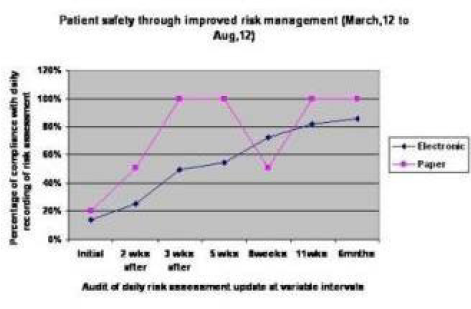Published online by Cambridge University Press: 15 April 2020
Fig. 1
[Improvement in daily accessible risk assessments]

We show enhanced patient safety through a quality improvement methodology project in an intensive psychiatric care unit of a psychiatric hospital in southwest of Scotland. This is a project as part of the national patient safety programme in mental health. The Scottish Patient Safety Programme for Mental Health aims to systematically reduce harm experienced by people using mental health services in Scotland, by supporting frontline staff to test, gather real-time data and reliably implement interventions, before spreading across their catchment area.
Multidisciplinary staff worked together in improving recording of daily electronic and paper based risk assessments from a baseline of 20% to nearly 100% over a sixth month period. We expect better quality risk management by readily accessible risk assessments and safe practise through enhanced safety perception by the patients as well as staff. Patient and staff safety perception tools were designed to measure impact of improvement in risk management. We have seen drop in the number of critical incidents and challenging situations requiring restraint following coordinated approach to risk assessment and easy access to key information. We have been successful as the frontline staff became part of the process of change and this has enabled sustained improvement.
Comments
No Comments have been published for this article.